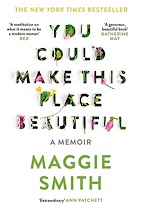 There is a highly irritating style of memoir – primarily but not exclusively written by Americans, primarily but not exclusively written by members of the so-called intelligentsia, but exclusively middle-class – which is about the memoirist’s astonishment that their life has been touched by a problem they feel is beneath them. Bad marriages, addiction issues, family illness, caretaking responsibilities, they simply are not supposed to happen to people with money. Middle-class people who write memoirs about these topics believe they should be exempt from the consequences of their choices, and tend to mistake life’s unhappinesses for microaggressions. If they are Americans, there is the further cultural belief that normal human suffering can be prevented by making the ‘right’ decisions in life (an illusion Americans will die, or allow their children to be shot, to protect). This arrogance and privilege is meant to eliminate life’s difficulties, as if anyone can enjoy a life free from pain, especially the self-inflicted kind.
There is a highly irritating style of memoir – primarily but not exclusively written by Americans, primarily but not exclusively written by members of the so-called intelligentsia, but exclusively middle-class – which is about the memoirist’s astonishment that their life has been touched by a problem they feel is beneath them. Bad marriages, addiction issues, family illness, caretaking responsibilities, they simply are not supposed to happen to people with money. Middle-class people who write memoirs about these topics believe they should be exempt from the consequences of their choices, and tend to mistake life’s unhappinesses for microaggressions. If they are Americans, there is the further cultural belief that normal human suffering can be prevented by making the ‘right’ decisions in life (an illusion Americans will die, or allow their children to be shot, to protect). This arrogance and privilege is meant to eliminate life’s difficulties, as if anyone can enjoy a life free from pain, especially the self-inflicted kind.
Maggie Smith’s pain – a divorce – is unfortunately a self-inflicted one. She thought her life, with its successful writing career and a solid family base in a small Midwestern town, was perfect. She married a man who expressed ambivalence about parenthood and had two children with him anyway, and was blindsided when she realised he was cheating on her. Despite a whole laundry list of warning signs which, by her own telling, Ms Smith minimised and ignored over the years, the inciting incident in their breakup was a poem of hers, called “Good Bones,” which was a smash hit in 2016. Before that poem, her marriage was built around an unspoken agreement that her career was an afterthought to her choice to become a mother, neither of which – not parenthood, and certainly not her career – were supposed to impact upon her husband’s life in any way. But after that poem, her career was no longer a part-time freelance gig done at the dining room table around the responsibilities of parenthood. When this overnight success meant the terms of the unspoken agreement of their marriage changed, the marriage ended.
Ms Smith talks a lot about unfair division of labour in her relationship and how she did more of the housekeeping and parenting responsibilities, and she talks a lot about how she met her husband in a creative writing seminar. She seems to think the latter should have prevented the former. As if left-wing men are allergic to the joys of patriarchy. As if she couldn’t have ensured that her female relatives and friends wouldn’t shoulder a large part of her husband’s parenting responsibilities. Ms Smith seems to have thought, at least in how she tells it here, that their comfortable middle-class life meant that all these issues of fairness and equality were beneath her attention, even as she minimised her achievements to prioritise her husband’s feelings. There are 314 pages of astonishment to get through as Ms Smith wonders if anything could have saved her marriage before she decides she’s a better, happier, more complete person now anyway, as are her children.
In those 314 pages, the word ‘feminism’ is never once mentioned. Ms Smith is utterly uninterested in the feelings or experiences of anyone other than herself. At least the narcissism is the book’s strange saving grace – you can enjoy the righteous feeling of being a smarter and more empathetic person than Ms Smith has, through these pages, proved herself to be.
When working-class people write about unexpected and unhappy life changes, their memoirs are marketed as misery lit. What the middle-class Ms Smith has written was gently spoofed in the recent American movie You Hurt My Feelings, in which a memoirist is told her book would have been more successful if her father hadn’t merely been emotionally abusive. But honestly. Here is a woman who has now written three (three!) tasteful memoirs about this divorce, and who seems to think that her hurt feelings and minor financial setbacks entitles her to our sympathy.
The trouble is that because of her class she will undoubtedly get a lot of both. With this book Ms Smith has been perfectly, poetically clear that her divorce was neither her fault nor her responsibility, and isn’t she a heroine for carrying on. By focusing on her hurt feelings instead of her choices, especially all the ones way back at the beginning, Ms Smith neatly diverts her responsibility for her own life and choices away from herself.
Any Cop?: It’s a tantrum of privilege, providing an anthropological study of American selfishness, but unfortunately nothing more.
Sarah Manvel
I read every word of this review. I almost nevrr read a review in its entirety. Well done, Sarah Manvel.
Oh my! I love a scathing review. I am noticing a tiny backlash against the recent spate of divorce memoirs, but overall it seems pretty trendy…